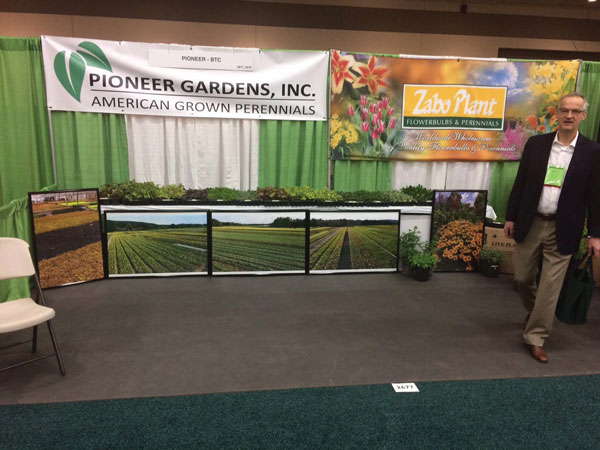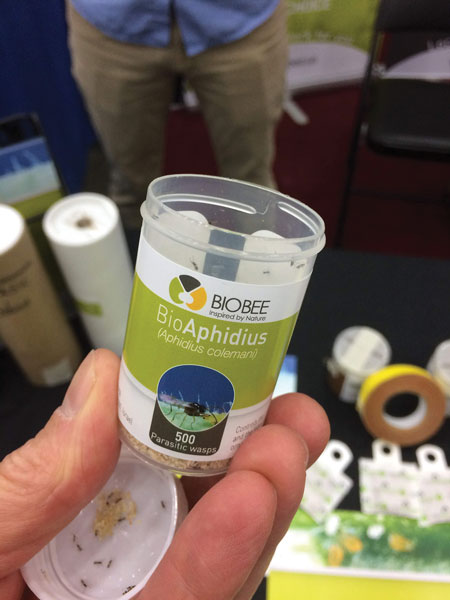3/1/2019
Trade Show Experience
Roger McGaughey
Recently, I had the pleasure of attending MANTS for the second time. But this year was different from the first time, when I was just an attendee. We (Pioneer Gardens) had a booth for the second time and sharing the experience there with Arjen Vriend and Ko Klaver put a different perspective on the trade show (Figure 1).
 Figure 1. Arjen Vriend in Pioneer Gardens’ and Zabo Plants’ booth at MANTS.
Figure 1. Arjen Vriend in Pioneer Gardens’ and Zabo Plants’ booth at MANTS.
I’ve attended Cultivate in Ohio annually for a number of years, but being on the inside at MANTS in the booth interacting with potential customers and answering their questions was a totally different experience. Usually, I walk the floor and try to get useful information from other booth personnel.
Pioneer Gardens and Zabo Plants shared a double booth space and we exhibited some of our products with accompanying photographs of our production fields on display. Photos are worth a thousand words and views of perennial bare root field production, complete with banker plants incorporated, were eye catching and stimulated interesting discussions with a number of attendees.
It’s a real joy to see how the BCA explosion has developed in the last 10 years. There are now some “new“ kids on the block as BCA providers, but it’s important to shop around—not only for price, but also for availability of fresh product. It’s also important to build relationships and ensure product support when deciding on a new supplier.
Booth location at a trade show can make all the difference to the amount of foot traffic, but sometimes you just get lucky and find yourself close to someone that offers products that you’re interested in. That was the case for me this year, as Global Horticulture was across the aisle from us and I was able to find out what new products they had to offer.
I got to know Casey Decker last year at Cultivate, and in addition to his new nematode production, he’s now also supplying aphid banker plants. Recently, we found out that Biobest, one of our usual suppliers, was no longer producing them.
Carol Glenister at IPM Labs was also at MANTS in a booth around the corner from us. They produce aphid bankers, too. We’ve relied on banker plants for in-house Aphidius production for many years and it’s important for our planning to have multiple sources available. Ron Valentin, now with BioWorks, started me on the aphid banker process almost 10 years ago and it’s proved very successful. A ready availability of fresh BCAs and their complementary support systems are vitally important to the ever-increasing number of growers who are relying on this type of biological production.
Biobee—another BCA company that I encountered at a symposium in Asheville, North Carolina, last fall—also had a booth at the show. They had a few new developments on display. With a focus on freshness and predatory insects being alive when they reach the grower, one they exhibited was a vial of Aphidius with a drop of honey inside the cap (Figure2). A food source for the wasps while in transit could be a real benefit. It will be good to develop this new relationship with their rep, Justin Leavitt, in the coming months.
While we’re focusing on controlling pests that we’re accustomed to, new ones appear that can very quickly build up populations and cause problems. These pests also aren’t being treated with pesticides, as we attempt to use as few nasty chemicals as possible when operating a biological growing program.
 Figure 2. Biobee now includes a drop of honey in their vials of Aphidius as a food source for the wasps while in transit.
Figure 2. Biobee now includes a drop of honey in their vials of Aphidius as a food source for the wasps while in transit.
Mealybugs are rapidly increasing in ornamental production and are very difficult to control; scouting crops is a vitally important aspect of a biological program. Unlike many other pests, mealybugs generally don’t appear on yellow sticky cards, so checking out the actual crops is essential.
When I discussed this pest with Suzanne Wainwright-Evans (“The Buglady”), her first question was, “Have you identified the species of mealybug?” There are a number of species and some predators only work on certain species. The same is true with aphids; only some species of Aphidius can control certain aphids. Information and education is very important, and the more we learn about our insect species and their life cycles, the more successful we’ll be with our biological control programs.
As I indicated in my last article (November 2018), field banker plants are really beginning to work for us, but there’s always more to learn. Being at MANTS with so many BCA suppliers all in one place at the same time provided a tremendous opportunity for information gathering and networking. As one BCA supplier remarked, MANTS is different from Cultivate because there are no seminars to compete with floor traffic, thus more attendees tend to visit their booth each day.
Another advantage of MANTS is that a lot of our customers were also exhibiting, so visiting with them was really easy. It was good to meet some of them for the first time and help explain how we’re attempting to provide them with biologically produced material. Discussing our experiences with them and trying to convince some of them to continue the process could prove to be time well spent. The more we can spread the biological message the better. GT
Roger McGaughey, head grower at Pioneer Gardens in Deerfield, Massachusetts, was educated in Northern Ireland and England and has 44 years experience as a grower.